Man, Machine, and God: Ignatius Forum Examines High-Tech Threats to National Security
By • January 11, 2023 One Comment 2303
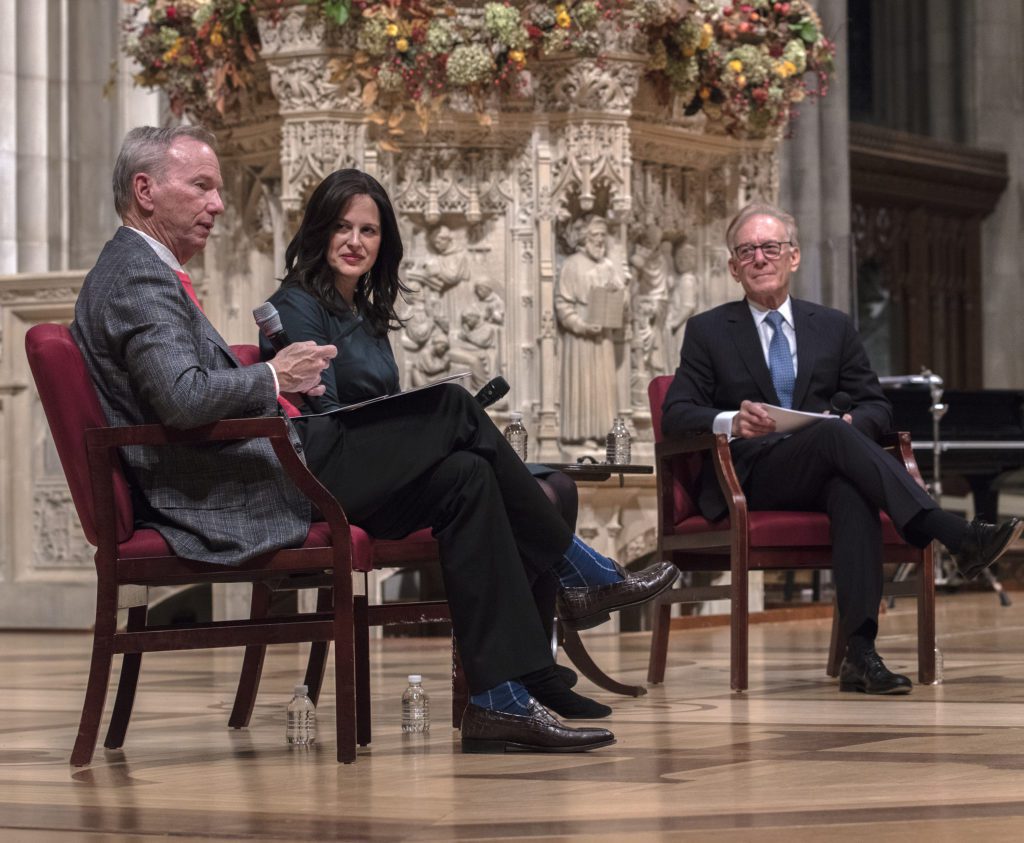
Alarm bells rang from the highest point in Washington after a recent Ignatius Forum — Man, Machine, and God — at the Washington National Cathedral. National security is at stake: The United States lags behind China in many areas of high-tech development.
The forum, held Nov. 16 in the Cathedral’s nave, examined the acceleration of Artificial Intelligence (AI) applications around the globe by competing powers, the values that should guide the accelerating high-tech competition and the needed human checks against the dangers posed.
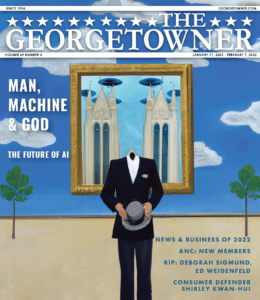
Inspired by Magritte’s surrealism and global competition over AI today, the art from our January 2023 cover was created using AI through the Dall-E 2 Program.
Hosted by Cathedral Dean Randy Hollerith, David Ignatius of the Washington Post and Judge Amy Ignatius (of New Hampshire), the forum speakers included former Secretary of State Henry Kissinger, Eric Schmidt, former CEO of Google and chairman of the former National Security Commission on Artificial Intelligence; Anne Neuberger, deputy national security advisor for Cyber and Emerging Technology; Debo Olaosebikan, CEO of Kepler Compute, and Dr. Noreen Herzfeld, professor of Science and Religion at St. John’s University College of St. Benedict (Minnesota).
Eric Schmidt outlined the high-tech competition between the United States and China: “China today… has four times as many engineers as the United States. Their industrial model is different. They use something called civil-military fusion. So, their tech companies do both military and civilian work. They have a program called Made in China 2025 where their goal is to make everything themselves… They have something called dual circulation, which means that they want to become less dependent on us and sell us more. In other words, have us be more dependent on them.”
“I can tell you that China’s ahead in communications, electronics… finance of one kind or another [and] surveillance,” Schmidt continued. We are slightly ahead in AI and slightly ahead in quantum [computing], and we are slightly ahead in biology.… And by the way, they’re ahead in new energy. So, all those nice electronic vehicles everyone’s using, they’re all basically made from parts from China and nowhere else. So, we’re very dependent on China and we’re also competing with them.”
Deputy National Security Advisor Anne Neuberger added, “When we compete with China, we’re not only competing on technology, we’re competing on technology combined with our values, our values that say we’re a democracy, we value civil liberties, we value privacy. And even as we seek to make use of large-scale data and the related models, we believe that can be done in a way that reflects those same values.”
Schmidt said the United States needs to be better prepared with high-tech defense tools and that the U.S. does not have a willingness problem, it has a bureaucracy problem. He added, “China has missiles that are much faster than the ones we have — they’re called hypersonic. That’s a problem. We need to address that. So, I think the way to do this is to say to people that our opponents have invented some new ways of doing damage to us, and we have to have a concerted effort, to protect ourselves. Not all of these involve escalating the war. Sometimes, they can be just better defensive systems, right? And I think that that’s all possible. The beauty of AI and software is it’s so much cheaper than an F-35 [stealth fighter aircraft]. You could have as many software people as I want the entire government to have in return for the cost of one F-35 of which we’re buying hundreds. So, we have the money, it’s just not in the right place.”
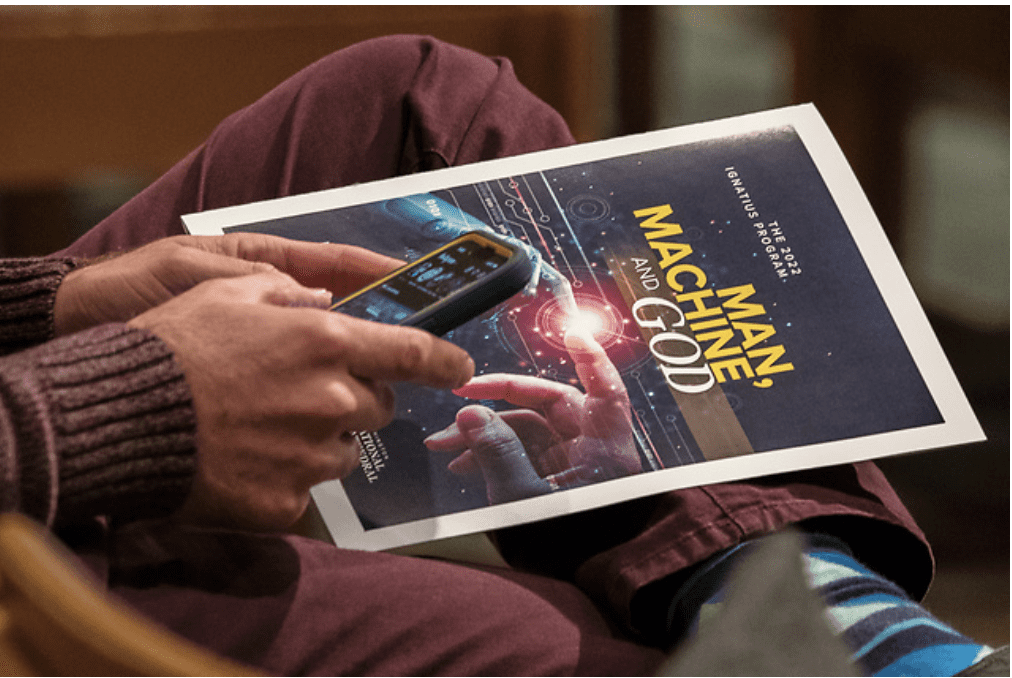
Photo by Colin S. Johnson, courtesy of Washington National Cathedral.
Schmidt pointed to the Ukrainians’ successful use of technology against Russian aggression: “It’s the first broadband war, and they’re using technology to defend themselves in very, very clever ways…. I would argue that drones will be more important than artillery because drones are more useful than artillery. They can see more, and they can do the same thing artillery can. So, why don’t we have a hundred? We have a hundred pieces of artillery in terms of [rounds per] soldier. Why don’t we have a hundred drones per soldier? That’s helping him or her do their work, be safe, see what’s going on and complete their mission.”
“I want us to win. And I’m very clear on that, Schmidt added as he discussed the tech-gap, “So, in order to do that, we’ve got to modernize our national security enterprise. And the national security people are very courageous, very smart people. [But], they’re trapped in an old system.”
Dr. Kissinger, in pre-recorded remarks, expressed hope that American and Chinese leaders will soon meet to set parameters on high-tech weaponry. He suggested the leaders say to one another, “We both have a lot of problems to discuss, but there’s one overriding problem, namely that you and I — uniquely in history — can destroy the world by our decisions, and…. it is impossible to achieve a unilateral advantage in this. So, we therefore should start with principle number one: we will not fight a high-tech war against each other.”
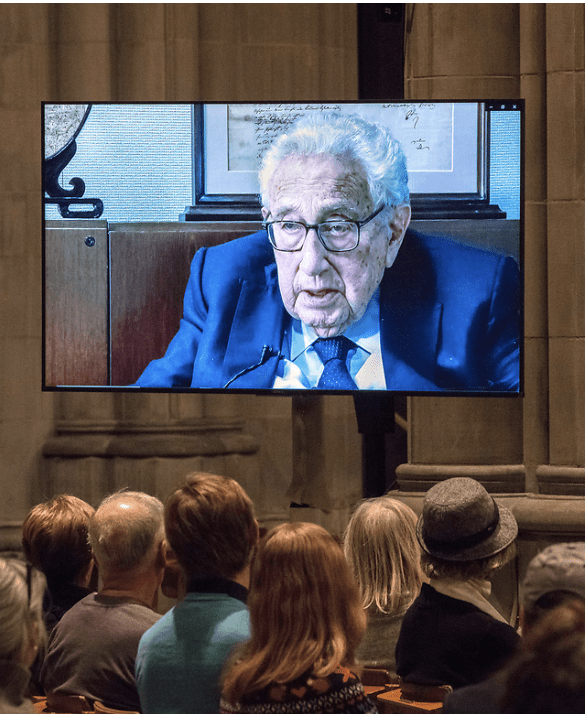
Former Secretary of State Dr. Henry Kissinger expressed concern about competition with China over Artificial Intelligence. Photo by Colin S. Johnson, courtesy of Washington National Cathedral.
Asked by David Ignatius if he is optimistic that humans will ultimately control machines and artificial intelligence, Kissinger said dryly, “I retain my optimism in the sense that if we don’t solve it, it will literally destroy us.”
A big challenge is the need for multi-billion-dollar outlays for new plants to make semiconductor chips which fuel the power of artificial intelligence. Most of these chips are made by Chinese neighbors. The founder of Kepler Compute, Debo Olaosebikan, says this must change. “Today we have one company, TSCM in Taiwan, that makes 90 percent of the most advanced chips that sell in the world today. There’s another very advanced… capability in South Korea.” Olaosebikan says his California company can provide next generation memory and CPU (central processing unit) chips based on ferroelectric material instead of silicon. “It becomes really important for us to think about how we bring that kind of capability here to the U.S. and create a little bit more balance. So, first you have this massive cost of advancing AI through the hardware. And then that turns into a geopolitical challenge and a national security challenge and a supply chain challenge.”
The Cathedral dean’s family is rooted in God and machines. Dean Randolph Hollerith’s great-grandfather was famous Georgetowner, engineer, and inventor Herman Hollerith (1860-1929) who founded the electromechanical tabulating machine company that became IBM. The Hollerith House at 1617 29th St. NW, built in 1911, remains one of the most stately mansions in Georgetown. At the outset of the Ignatius Forum, Dean Hollerith asked about the theological and spiritual implications of a technology [Artificial General Intelligence] that some believe will one day approach the level of human consciousness. “If we can create artificial intelligence, is it really intelligence if it does not include compassion and empathy?”
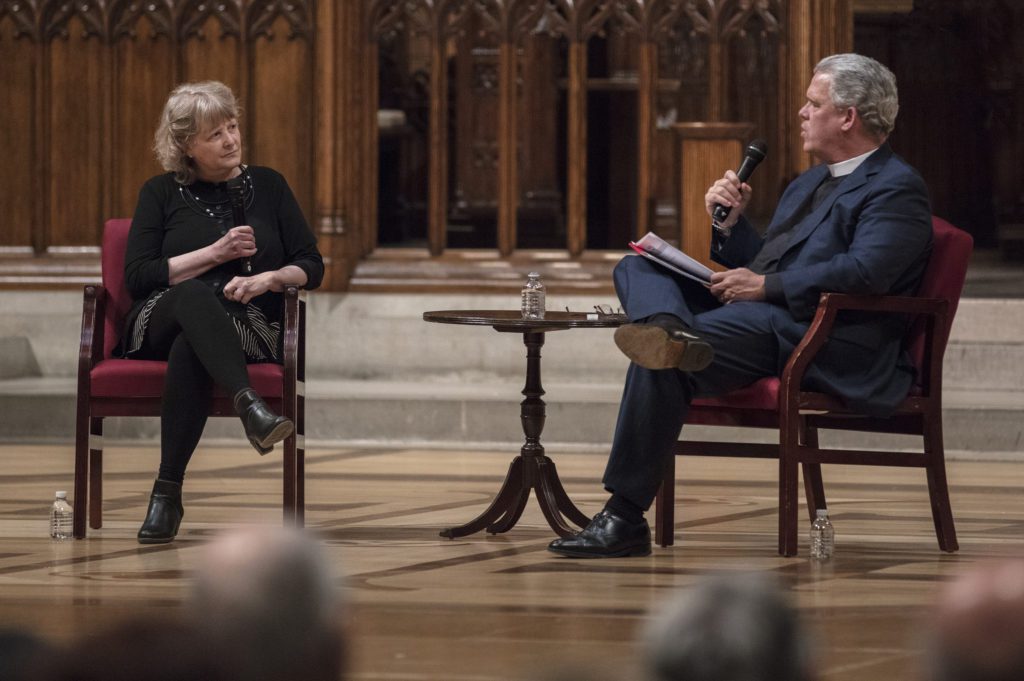
Dr. Noreen Herzfeld, Professor of Science and Religion at St. John’s University and the College of St. Benedict, addresses the moral and spiritual dimensions of the issue with Cathedral Dean Randy Hollerith, descendent of Herman Hollerith developer of the data punch card and founder of IBM in Georgetown. (See plaque on building by C&O Canal at 31st Street.)
Dr. Noreen Herzfeld, Professor of Science and Religion at St. John’s University and the College of St. Benedict, also addressed the moral and spiritual dimensions of the issue: “We grow too soon technologically capable, but too late morally responsible …. As we look at our technologies, we somehow think they’ll solve our problems for us. But the root of the problems is in us. It’s in our desires. It’s in our fears, and it’s in our longings. And it’s the religions of the world that are trying to help us get a handle on those fears and desires and longings. And we need to put our focus first there and then only secondly on technology.”
The Ignatius Forum, presented annually since 2008 at the Washington National Cathedral, brings leaders together to discuss world challenges. It honors Paul Ignatius, Secretary of the U.S. Navy from 1967-69, and the late Nancy Ignatius.

Jan Smith is an award winning free-lance video journalist. She is a member of the Cathedral’s congregation involved with the oral history project for the Cathedral’s Racial Justice Task Force and is also chair of the RJTF’s program committee. https://cathedral.org/about/leadership/jan-c-smith/
To learn more about AI here are details of a conference on Feb. 9 – 14 – Annual Conference: Assoc. for the Advancement of Artificial Intelligence (AAAI), Walter E. Washington Convention Center. For more info go to Aaai.org/Conferences/AAAI-23/.


Howdy! I just would like to give you a big thumbs up for your excellent information you’ve got here on this post. I’ll be returning to your web site for more soon.